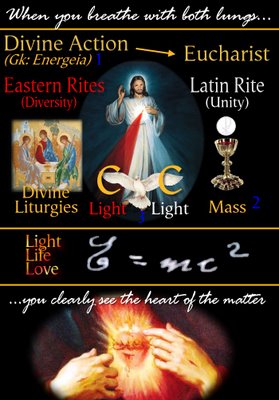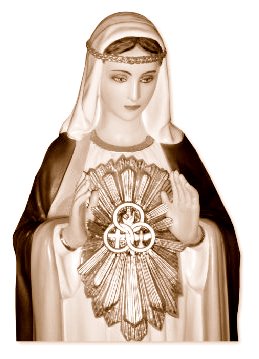Thirty-three (33) Reasons
There are at least thirty-three good reasons why it is worthwhile to
review the life and times of Albert Einstein to ponder the mysterious
relationship between his life and legacy and the Holy Eucharist.
+++
The Bread of Life, the source and summit of our faith,
the antithesis of what Pope Benedict XVI called the
"dictatorship of relativism"
The Kingdom of the New and Everlasting Covenant
the antithesis of what Pope John Paul II called the
"culture of death"
I. Let us begin with names.
God's revelation, His plan for all of human history, is often tied to the bestowing and changing of names. Names carry meaning, and they are but one way of linking the Old and New Testaments. This is done through the study of biblical typology where there is a clear bridge between the Jewish and Christian faiths.
Moses (Drawn from the water)/Joshua (God saves) (OT)--->Jeshua-Jesus (the Living Water)(the Savior) (NT), Miriam (OT)--->Miriam (Mary) (NT)...Two great examples of how an OT "type" relates to the NT "fulfillment."
As St. Augustine relates it, "the New is concealed in the Old and the Old is revealed in the New."
Christening is the process of naming a child of God at his or her baptism. It should not be taken lightly.
Ia. Albert - meaning noble and bright
Albert – St. Albert the Great (1205-1280) the greatest of pre-Reformation Catholic scientists; schooled and grounded both in theology and science; a native German also from the vicinity of Ulm; mentor of St. Thomas Aquinas (an Italian) and theological genius, well ahead of his time. St. Albert is the patron saint of all scientists.
St. Albert the Great was convinced that all creation spoke of God and that the tiniest piece of scientific knowledge told us something about Him. Besides the Bible, God has given us the book of creation revealing something of His wisdom and power. In creation, Albert saw the hand of God. (Source: EWTN)
Both St. Albert and St. Thomas are Doctors of the Church; their lives bear witness to the fact that there was no disagreement (only apparent contradictions) between Faith and Reason and between Faith and Science.
See ALBERT, THE GREAT at http://www.newadvent.org/cathen/01264a.htm
Ib. Einstein - meaning one stone
Sacred Scripture shows us the importance that God places on both stone and rock: altars of stone, "sharp stone" for circumcision, Moses striking the stone twice, "two tablets of stone," David's "smooth stone" slaying Goliath, "the stone the builder rejected, now a cornerstone," "they decided to stone Him," tombstones, capstones, millstones, stumbling stones, "I will take away the stony heart," "you are Rock, and on this Rock." They are all important, for they provide us a medium for the conveyance of the analogical truth about God's relationship with man and good creation. God is fond of working with what is solid, after all He is the Rock who saves us.
See STONE in Sacred Scripture at http://www.drbo.org/cgi-bin/s?q=stone&b=drb&t=0
If you'd like to follow the clues yourself, here they are:
II. Einstein: inspiration...riding a beam of light back to its source, his relationship as a child seeking the secrets of God, the "Old One"
III. Einstein: a Sign of Contradiction...a slow learner...maybe, but his memory was sharp
IV. Einstein: the son of Herman, a German "Father of Lights"
V. Einstein: the special gift of a magnetic compass...orientation to truth and mystery at age 5
VI. Einstein: the Great Event—Lighting up the Munich Oktoberfest in 1885
VII. Einstein: three years of Catholic school education (age 6-9)
as 69 children learned the catechism and began to understand the sacramental life of the church to include First Holy Communion
VIII. Einstein: the priest->nail->"Jews did this to Christ" incident at the Peterschule and potential isolation and subconscious scarring
IX. Einstein: love of his little sister Maja (meaning, Sea of bitterness), music and a religious awakening
X. Einstein: layering of knowledge...Jewish (secular), Catholic (religious), Talmud (religious), Science
XI. Einstein: rebellion against a secular family
XII. Einstein: rebellion against religion in favor of science (Max Talmud :) Talmey)
XIII. Einstein: Immanuel Kant, as mentor (even his name is significant, "singer of God with us"...not)
XIV. Einstein: Euclid Geometry and a first instance of future genius
XV. Einstein: falls for Greek-Orthodox physicist, Mileva Maric, who apparently converts to Catholicism in 1905
XVI. Einstein: Liesel (meaning, God is my oath), the shotgun marriage, and mystery of baby's fate
XVII. Einstein: 1905 Albert Einstein's annus mirabilis...a "Light-filled" revelation
XVIII. Einstein: E=mc2, the "holy grail" of energy
XIX. Einstein: Olinto DePretto, the Italian scientist from Vincenza...was he the real author of E=mc2?
XX. Einstein: Special Theory of Relativity and the seeds of Relativism
XXI. Einstein: relationship to Sigmund Freud
XXII. Einstein: The Eclipse of 1919, opportunity seeking Eddington
XXIII. Einstein: Quotable Quotes on mystery and bridge between faith and science
XXIV. Einstein: divorce to Mileva and his adultery, Baruch Spinoza's philosophy
XXV. Einstein: The Nobel Prize for Physics...for the both/and of Light (photoelectric effect), not Special or General Relativity
XXVI. Einstein: 1933 and the Great Escape from Hitler's Third Reich
XXVII. Einstein: Letter to President Roosevelt urging the Allies to pursue the development of the atomic bomb
XXVIII. Einstein: Trinity Project (not part of it) and its epic proportions and ramifications
XXIX. Einstein: Humanist, Pacifist, Zionist vs. Christian – Humanism, Peace, New Zion
XXX. Einstein: President of Israel?...Not
XXXI. Einstein: Fr. Charles McTague and the mystery of Transubstantiation vs. quantum "spooky" mechanics
XXXII. Einstein: Quest and failure to discover the Grand Unified Theory
XXXIII. Einstein: The Rainbow Bridge, the True Bridge Over Troubled Water constructed for the future of mankind
Become like Jesus
Live for the Triune God
Seek the Light of Our Lord Jesus Christ!
See you on the High Ground!






























No comments:
Post a Comment